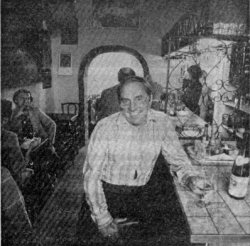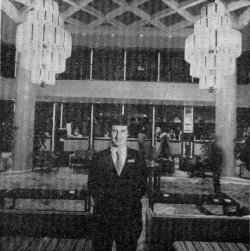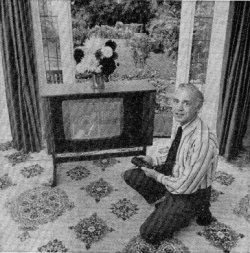|
|||||||||||
OCTOBER 1981: NATIONAL TELETEXT MONTH
It was a good year for teletext, as Ceefax Duty Editor Graham Clayton told Bob Smyth.
Graham Clayton, the Ceefax Duty Editor, is particularly pleased with the system's achievements during the Space Shuttle flight earlier this year. 'We had set up a feed from mission control so we could hear what the controllers were saying all through the trip. Our keyboard operator used this as the basis for what was virtually a simultaneous caption to the pictures, so you could find out exactly what was happening. Even when the pictures of the flight were not being shown you could turn to the Ceefax page at any time during broadcasting hours and check on progress.'
Throughout the domestic 'Event of the Year', the royal wedding, BBC2 used Ceefax's 'Palantyping' system to the full in order to give a synchronous 'translation' for deaf viewers of what was being said during the ceremony and the commentary on the rest of the proceedings. Half a million viewers took advantage of this visual aid on BBC2 and, as the RADIO TIMES letters page testified, it was not only the hard of hearing who felt it provided a valuable visual aid. A few grumbled at occasional garbled words, but, since the Ceefax computer is not yet 100 per cent perfect at translating the phonetic shorthand symbols fed into it by the Palantype operators, a few verbal hiccups were inevitable.
A market survey carried out by Philips noted that the number of teletext set owners would more than double in 1981 and that - with sets now at only £100 or so more than a normal colour television - by 1985 teletext machines would account for up to one quarter of new colour sets being bought. According to the same survey the most popular pages are the news, television and radio programme guides and sporting results. Fun and puzzles are the biggest draw on the BBC2 channel. Peak viewing is in the early evening. The average number of times the teletext facility is used in the week amounts to 77, the average number of different pages watched is 29, and the viewing time reaches the surprisingly high rate of almost two hours a week.
A national campaign this month, sponsored by the Department of Industry, aims to increase teletext usage even further. Several million pounds will be spent on promoting sets or adaptors for sale or rental. Dealers all over the UK will be demonstrating the potential of the system in local showrooms. And, as you may have already noticed on the advertisement pages of this and other magazines, the manufacturers are undertaking a mammoth exercise to educate that part of the public which is unaware that the teletext service is free, and other such basic facts.
The target is not only the general public but specialist users. As Bob Piercy points out, many businessmen find the financial information valuable - and the more attractive because it is free. The Portman Inter-Continental Hotel at Marble Arch has installed teletext machines in all its rooms in order, in the words of the general manager, 'to cater for the growing industry/business needs of our guests'. And the
MCC is rumoured to have installed a set in their players' changing room to enable them to keep up to date with cricket matches elsewhere.Graham Clayton outlines the specialist advantages of the Ceefax service while recognising its limitations. 'If you are thinking of going abroad and want the current exchange rate for the countries you are visiting then we can give it. If you are a toy manufacturer and want to check the price of tin to see that there have been no violent fluctuations, we can help. But if you want share prices in full detail you will probably subscribe to a commercial service, though for a general view of what's going on in the City we can provide it.'
Among other professional users he mentions farmers, who can obtain the latest price information and warnings of crop diseases, and all sorts of people in the transport business. 'We heard of a manager who worked at the headquarters of a supermarket chain who regularly checks with our pages reporting road traffic delays and if necessary re-routes his lorries so that they don't run into trouble.'
An unexpected use of the system is its application in language teaching. 'Because our pages are written in very simple English, using short words, teachers can employ it in teaching English to foreign students. They can study our news pages at leisure, and then listen to the news broadcasts to see if they have got the pronunciation right.' Ceefax also exchanges pages with the Austrian Brdadcasting Service, so that the English-speaking community in Vienna is able to view half a dozen BBC news pages each day. Conversely, those in Britain wanting to brush up on their German can test their comprehension by scanning the reciprocal pages detailing what's on in Vienna.
As a concluding example of Ceefax's virtuosity, Graham mentions the 'living page' service which, just as it gave continuous coverage of the Space Shuttle mission, was used to provide the fullest information available about this year's Open Golf at Sandwich. 'We installed our own terminal on the course - which is very economical: one man with a machine plugged into a telephone line. He kept the leaderboard continually updated, which "ordinary" television did only intermittently. Television and radio are good - indeed brilliant on these sorts of occasion - but in this respect they cannot match what the Ceefax service can provide.'
| Peter Hicks
Owner of the Brentham Vineyard wine bar in West London, Peter Hicks installed his teletext set three years ago. 'It's ideal for a public place because it's silent and doesn't intrude. People can watch it or ignore it - it's up to them. We can show the roll-over pages, or leave it on the index page so they pick up the remote control and choose for themselves. 'It's well past the gimmick stage here. We find a lot of people come in to look up the last-minute holiday flights or how many seats there are left on Freddie Laker's planes. At lunchtime businessmen come in and look up the latest news and information. In the evenings people also use the fun side - the quizzes and so on. And Saturday is very much a racing morning. They look up the card and pop out to the betting shop along the road.' |
 |
 |
Bob Piercy
A television dealer in London's Pimlico and one of the earliest teletext traders, Bob Piercy is himself a user of the equipment he is in business to sell. 'Apart from my personal viewing of news and so forth, we use it in the shop to check on exchange rates. We get visitors to Britain coming in with all sorts of currencies. If you can show the latest exchange rate on the screen there's no argument with the customer and you can do a deal on the spot. 'Several of my customers are businessmen who prefer teletext to Prestel or use it in addition to Prestel. It takes a little bit longer to get the information, but if it's not frantically urgent they are likely to turn to the teletext financial pages rather than pay all the extra cost involved for a Prestel page. The commercial reps who visit us as part of their calls around the country also use it. They find it helps them a lot to have up-to-date weather and traffic information.' |
| Rob Sullivan
is front-of-house manager at the Gloucester Hotel, on the way in to central London from Heathrow airport. 'A lot of people look up the weather map which is colour-coded for temperatures in different parts of the country. It's a general interest thing for people sitting there, something for them to fiddle around with. But it's also useful for those travelling around. 'Many of our clientele are businessmen and like to catch up on the latest news and practical information. General sporting reports are popular, especially football because it's a very international sport. We have a fair number of Scandinavians staying here and they follow English football. Americans in particular are fascinated by the machine. They say they have nothing like it back home. And at Wimbledon it gets a hell of a lot of use. We have press, officials and players staying here and it enables them to keep in touch with what's going on.' |
 |
 |
Alan Roberts
Alan Roberts, deaf for almost 20 years, has been one of Ceefax's most vigilant users and an energetic campaigner to extend the services teletext offers the deaf and hard of hearing. 'Most people think television is ideal for deaf people. They don't realise that it is virtually impossible to lip-read what is being said. You may find it difficult to believe but a lot of deaf people watching television programmes make up their own stories to match what they are seeing on the screen. 'We are getting to the stage where deaf people are becoming impatient. The Palantyping of Charles and Di's wedding was marvellous, but more use should be made of the system. We need more programmes for the deaf - a regular evening news magazine, for instance - which ideally should be of interest to the general audience as well. Teletext may be a luxury extra for the ordinary viewer. For the deaf it is as important as braille for the blind, and possibly more so.' |
For
discussion about all aspects of teletext, from content right through
to complex technical matters.
If you have a question, this is the place to ask it...
![]()
mb21 by Mike Brown
![]()